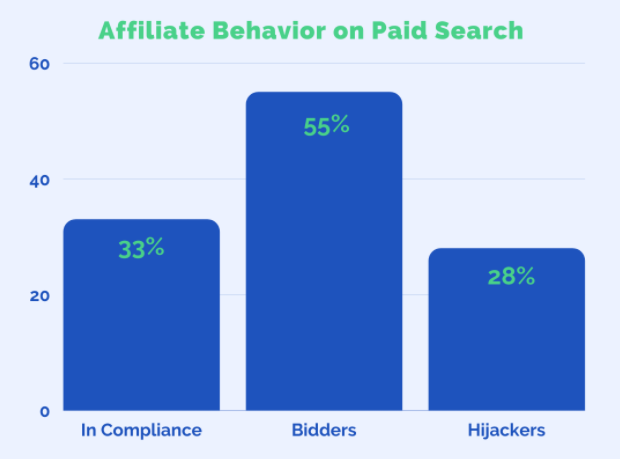Brand protection Lesson #4: Partner/affiliate relationships
If you sell online, having an affiliate program can help you dominate page one, drive more revenue, manage costs, and build your brand. By carefully selecting a group of your best affiliates to work with you, you can use this powerful cost-cutting technique that can also boost clicks and sales.
Let’s dig a bit deeper into tactics that will help you better control the search engine results and your CPC prices by coordinating your brand bidding with partners and affiliates. Here are the basics:
- Identify a group of affiliates that you will allow to brand bid.
- In your contracts, clearly spell out that no affiliate can rank above you in branded PPC.
- Ensure affiliates have more relevant ad copy than your competitors by helping them to describe your products and services in depth in their ads and landing pages.
- As you mature the program, consider whether you should remove brand-bidding rights from all but your best three affiliates. This helps make sure your CPCs don’t get out of control.
Affiliate management and coordination takes constant vigilance. (Sorry, there are no freebies in PPC!) This is accomplished with dedicated personnel and PPC monitoring tools that can automate the detection, reporting, and communication with affiliates and the engines.
Who are Your Partners?
- Affiliates. Affiliates are partners who send visitors to the brand holder’s website through a referral link. Online retailers commonly work with partners in this way through affiliate networks such as Linkshare Rakuten or Commission Junction. Examples include coupon code websites, bloggers, or review sites.
- Resellers. Resellers is just a fancy name for affiliates who refer leads instead of direct purchases. The leads captured by the reseller are sent to the brand holder for conversion. We often see resellers operating in finance, insurance, and telecom. An interesting nuance to this type of relationship is that the reseller will usually have authorization to use the brand in its URL, for example: “www.verizonfiosbundles.com” or “www.buyverizon.com.”
- Partners. Travel services (such as hotels) work through online travel agencies like Priceline or Expedia.
- Franchisees or Dealers. A franchisee (or dealer) relationship is a brick-and-mortar concept commonly found in automotive or education, where there is a physical, in- market store. In these arrangements, the dealer has certain marketing rights restricted to a geographic boundary.
- Online Retailers. We don’t usually think of retailers as “partners” or “affiliates,” but in fact they are if the brand holder is a manufacturer. Manufacturers sell through retailers and can benefit from the page ownership strategies discussed here.
The Benefits of Brand Bidding with Partners
Whatever industry you advertise in, the coordination of brand bidding with the partners described above has tangible and measurable benefits, including:
- Controlling page 1
- Pushing out competitors
- Lowering CPC costs
- Driving more visits
- Improving return-on-ad-spend (ROAS)
- Growing revenue
Partner Brand Bidding Tactics
Let’s start with an important definition. Partner brand bidding means that you allow some of your partners to bid on your brand name or brand-plus phrases in order to control the page real estate. For partner bidding to work, you need to run a tight ship. Your tactics must include four key elements:
- Media strategy
- Legal agreement
- Ad monitoring
- Compliance enforcement
Tactic #1: Media strategy
Before you can implement a partner strategy, you need to define your media strategy. This, in turn, will help you formulate your program rules. Questions to address include:
- Do you want to brand bid alongside partners? If you have an active and aggressive SEM strategy, you will be bidding heavily on all brand variations. You will want your partners at your side, with you in first position and your partners blocking the ranks directly below you from competitors. Some companies have hundreds of affiliates but may only allow PPC brand bidding for their best three or four partners (super-affiliates).
- Do you want to use partners to offset PPC ad spend? If you are looking to scale back your ad spend on PPC (maybe you had a budget cut), you can use your partners to fill in the gaps. In this case, you might want to anoint a few special super-affiliates and encourage them through incentives to maintain the top ranks. Or you may want to adopt a very loose brand-plus bidding policy and allow all of your affiliates to have access. If you find yourself in this boat, remember, you still need to bid on your own name. Do not give that up!
- What about offering incentives like co-op ad money? Perhaps you could control the search results pages better as a manufacturer by offering co-op ad dollars.
Tactic #2: Legal agreement
Once you have defined your media strategy, it’s time to meet with your legal team and put the plan into writing. You will need a well-defined legal agreement that specifically explains the rules of the engagement, notice procedures and enforcement (i.e., you lose your payout, or hasta la vista, baby, you’re kicked out of the program!).
The areas where restrictions can apply include:
- Allowed and prohibited keywords. Be specific and/or define classes of keywords.
- Allowed and prohibited ad copy. You can refer to an external policy document that changes from time to time in order to give yourself flexibility with wording and offers.
- Page rank. If you are bidding alongside partners, you will need to define page rank rules. Examples include: never above you, or your brand is always first on keywords x, y and z.
Tactic #3: Ad monitoring
With the strategy and legal out of the way, it’s important to remember that your plan to corner the market is only as good as your enforcement. Best practices here include:
- Use ad monitoring software. Search ads on each page refresh and vary based on the location of the searcher. It is nearly impossible (and boring) to monitor them manually. Make sure you find a vendor who can check ads several times a day and across multiple locations. If you are hyper geo-sensitive, as you should be in industries such as telecom or automotive, your vendor will need to provide city and maybe even ZIP-code-level monitoring.
- Review summaries, not the details. The Search Monitor often gets asked by clients for alerts to be sent each time a violation is found. Before you request something similar, consider this: If our company were to monitor 30 brand-plus terms across 100 geographies, that would equate to 3,000 checks at a time. Do you want 30, 300 or 3,000 alerts to review? Instead, we recommend looking at the summaries. If the percent of violations becomes considerable, then it’s time to take action. One caveat for you: If you are in a regulated industry with ad copy sensitivity, then every violation counts and needs to be considered.
Tactic #4: Compliance enforcement
The manner in which you will enforce your policies should be neatly detailed in your legal agreement. Remember to be kind to your super-affiliates with fair notices and consequences, and act swirly against those that are not your super-affiliates (because they are just mucking up your plan).
Can You Make Partner Brand Bidding Work?
The tips for working with partners that we’ve just shared require time and effort to enact, plus some common sense when it comes to enforcement. It’s important to remember that partners are taking on the cost and risk of promoting your product and in most cases, will appreciate receiving clearly defined brand PPC bidding rules. Since the search engine algorithms are (and will remain) black boxes whose costs are based on vague concepts such as relevancy and quality scores, it’s important to control whatever you can.
We began this topic by stressing the variety of marketing partnerships that exist, and how successful brand bidding campaigns depend on effective partner coordination. Your eyes are hopefully open much wider to the benefits of a coordinated page one strategy with your partners.
* * *
In Lesson 5, we’ll outline do’s and don’ts for dealing with competitors who bid on YOUR brand name.

|
72% of affiliates comply but the remaining 28% do not. Many knowingly practice affiliate fraud. |












